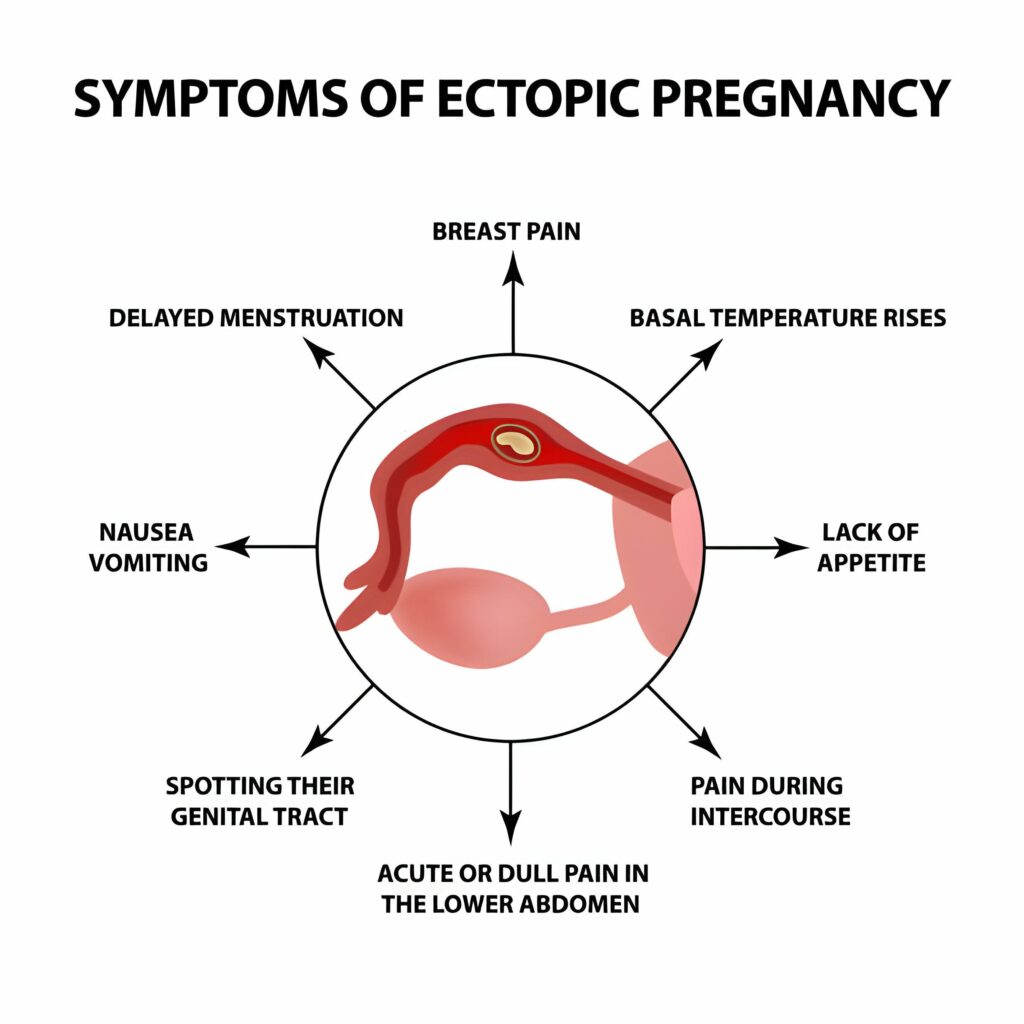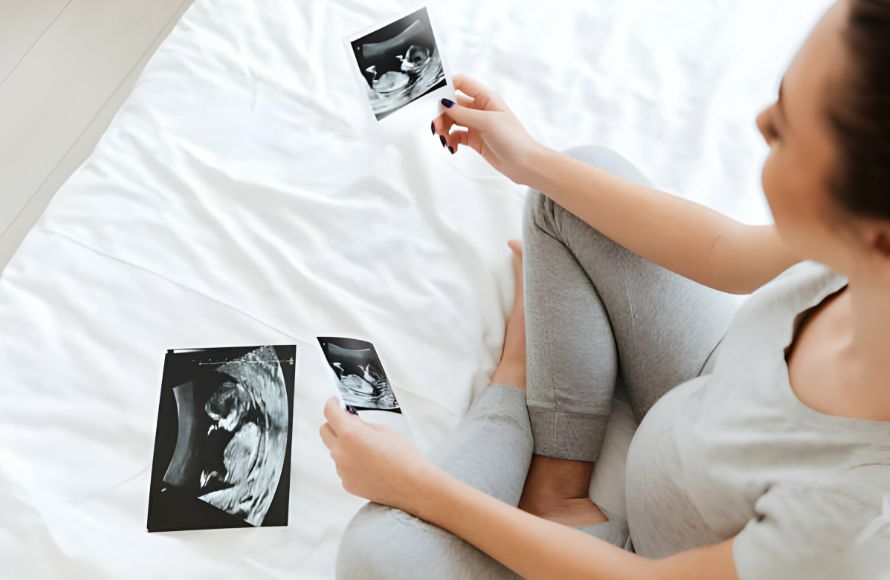Pregnancy starts when an egg present in the womb of a woman is fertilized by sperm. The fertilized egg then travels to and binds to the lining of the uterus. This is the normal route for pregnancy. However, if the egg does not follow the natural path and starts growing outside of the uterus, this condition is known as an ectopic pregnancy.
You can diagnose this type of pregnancy in the early stages and take control, but still, 2% of overall pregnancies are ectopic pregnancies.
Ectopic pregnancy can cause life-threatening conditions like hemorrhage if not treated on time. That is why it is necessary to know the symptoms so that you can diagnose them far earlier and consult with your doctor immediately to avoid any serious situation.
What is an Ectopic Pregnancy?
The egg, after fertilization, normally attaches to the lining of the uterus. If it does not do so, it will grow somewhere outside the uterus. This type of pregnancy is known as ectopic pregnancy.
Due to this reason, this condition is also known as extrauterine pregnancy. The fertilized egg, most probably, grows in the fallopian tube in the reproductive tract of women.
When the egg gets attached to the fallopian tube, the pregnancy is referred to as a tubal pregnancy, comprising over 90% of ectopic pregnancies.
Other potential areas for its growth outside the uterus are the belly, ovaries, or lower area of the cervix above the vagina.
Ectopic Pregnancy Symptoms?
The symptoms of ectopic pregnancy are mild at first. However, some women in the early stages of pregnancy might experience tenderness of the breast, nausea, or a missed period. Below are other common symptoms:

Bleeding from Vagina
Vaginal bleeding is one of the first warning signs of an ectopic pregnancy. It is not quite similar to that of your period bleeding, but it occurs intermittently.
It means that you might experience bleeding from the vagina, and it stops after some time. The color of the blood might be dark brownish, and the texture is too watery.
Still, the majority of the women misinterpret this bleeding for their menstrual cycle and fail to recognize that they are pregnant. Consult your doctor if you are facing vaginal bleeding.
They will probably perform a pelvic exam, an ultrasound to look at the pregnancy, and maybe a blood test for the pregnancy hormone known as human chorionic gonadotropin (hCG) if they think you might have an ectopic pregnancy.
Belly Pain
The signs of an ectopic pregnancy vary, but one of the most prevalent is pain in the abdomen.
You may experience stabbing, sharp pain accompanied by crams, or discomfort in your lower back or one side of your belly.
However, it is important to consider that abdominal pain is a normal sign of pregnancy, even if it is not ectopic.
It can occur due to bugs in the stomach or the wind trapped in the abdomen. So, it is essential to visit the doctor if the condition worsens.
Bowel or bladder problems
A disturbance in the toilet may be a sign of an ectopic pregnancy. It usually happens when the egg grows in the fallopian tube, causing irritation or putting pressure on adjacent organs, such as the bladder and bowels. This may result in:
- Pain: You may experience pain when using a bathroom, such as when urinating or feces.
- Modifications in bowel habits: constipation, diarrhea, or trouble passing the feces.
- Urinary urgency or frequency: the need to go to the bathroom more frequently than normal, especially for minor purposes.
Pain in shoulder
Even though they are rare, shoulder pain can be a worrying sign of an ectopic pregnancy—a pregnancy in which the fertilized egg is implanted outside the uterus.
This pain is usually severe and sudden near the tip of the shoulder, and it is caused by internal bleeding hurting the diaphragm while breathing.
Even though there may be other reasons, if you have shoulder discomfort combined with other possible pregnancy symptoms like dizziness, irregular bleeding, or stomach pain,
you should consult a doctor right away. Early identification and treatment are critical for avoiding complications related to ectopic pregnancies.
Risk factors for Ectopic Pregnancy
It’s not necessary to state any factor that would assuredly indicate if you’re at risk of having an ectopic pregnancy. It is not necessary to state any factor that would assuredly indicate that the respective women are at risk of having an ectopic pregnancy. However, a few risk factors often seen with this condition are as follows:
- Have used assisted reproductive technology, such as intrauterine insemination (IUI) or in vitro fertilization (IVF)
- Encountered any sexually transmitted infections (STIs)
- Have endometriosis
- Experienced a previous ectopic pregnancy
- Have an infertility history
- More than 35 years old
- Have had surgery on abdominal, pelvic, or fallopian tube
- Smoke cigarettes
Is it Really Dangerous?
If left untreated or not detected on time, ectopic pregnancy can cause life-threatening diseases. As the gestation age increases, the size of the embryo also increases.
If located in an area other than the uterus, like the fallopian tube, it can cause a rupture in the tube or cause it to burst. This can lead to major internal bleeding and require an emergency operation.
Usually, this condition occurs while using contraceptives. So if you became pregnant while using a birth control device or intrauterine device, you should immediately go see a doctor, as it can be an alarm for an ectopic pregnancy.
Conclusion
Ectopic pregnancy means that the egg, which has been fertilized by the sperm, has not aligned itself with the lining of the uterus. Instead, it has moved to some other place, like ovaries or mostly fallopian tubes, and grows there. Although the chance of ectopic pregnancy is very rare, 2% of people still suffer from this condition.
If you are pregnant, it is important to trace the symptoms of ectopic pregnancy, as it should not be taken for granted in any case as it can cause life-threatening conditions. If you are doubting whether your pregnancy is ectopic or not, you can get the idea from the symptoms. However, the best solution is to discuss it with your doctor.
Related Articles
Want to know more about pregnancy and staying healthy during this time? Check out these articles:
- How to Use a Pregnancy Pillow: Learn about the benefits of using a pregnancy pillow and how to use it properly for a comfortable night’s sleep during pregnancy.
- Changes in Smell During Early Pregnancy: Explore unique aspects of pregnancy, like changes in your sense of smell. Find out what hCG, a hormone related to pregnancy, might smell like in early pregnancy.
- When to Tell Your Employer About Your Pregnancy: Learn the best time to share your pregnancy news with your employer. Get tips on how to handle this professionally.
- What Drinks Can Help Prevent Pregnancy: Learn about natural methods to help plan your family and avoid pregnancy. Discover what drinks might assist in this process..
- Why You Should Avoid Bananas During Pregnancy: Find out why some foods, like bananas, might not be the best choice during pregnancy. Learn about other healthy options you can enjoy instead.
- Interpreting Pregnancy Test Results at 4 Weeks: Get insights into reading pregnancy test results. Find out what a dark line on the test means at four weeks into pregnancy.
